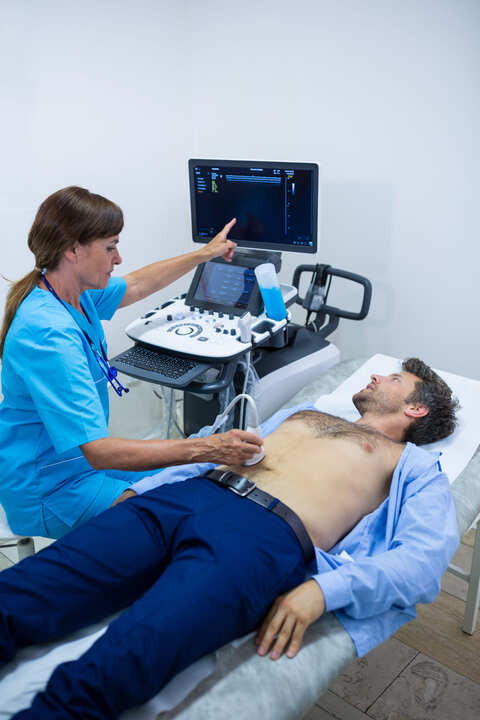Last updated on June 30th, 2025 at 06:32 pm

Gallstones are small, hard deposits that form in the gallbladder. They are made of cholesterol or bilirubin and can cause severe pain and discomfort. Gallstones are a common problem, affecting millions of people worldwide. Traditionally, surgery has been the main treatment option for gallstones, but there are now non-surgical solutions available. This article will explore the different non-surgical options for treating gallstones and provide advice on how to choose the right treatment for you.
What are gallstones and how are they formed?
Hard deposits called gallstones develop in the gallbladder, a little organ under the liver. They can range in size from being the size of a golf ball to a grain of sand. Gallstones are formed when there is an imbalance in the substances that make up bile, a fluid that helps digest fat. If there is too much cholesterol or bilirubin in the bile, it can harden and form stones.
Gallstone development is potentially influenced by a number of risk factors. These include being overweight or obese, being female, having a family history of gallstones, and having certain medical conditions such as diabetes or Crohn’s disease. Gallstones can cause symptoms such as severe abdominal pain, nausea, vomiting, and fever.
Conventional treatment options for gallstones
The conventional treatment for gallstones is surgery, specifically cholecystectomy, which involves removing the gallbladder. This is a relatively safe and effective procedure, but it does involve risks such as bleeding, infection, and damage to nearby organs. Recovery time can also be lengthy, and there may be some dietary restrictions after surgery.
For patients who are not suitable candidates for surgery, there are other conventional treatment options available. These include medications such as ursodiol, which can dissolve some types of gallstones, and lithotripsy, a procedure that uses shock waves to break up gallstones. These treatments are not as effective as surgery and may take longer to produce results.
Gallbladder Stones Treatment Without Operation
For people who cannot undergo surgery or prefer not to, there are non-surgical solutions available. These treatments aim to dissolve or break up the gallstones, allowing them to pass through the bile ducts and out of the body naturally. Gallbladder Stones Treatment without Operation include:
· Oral bile acid therapy: This involves taking medication that dissolves cholesterol gallstones over time. The success rate is around 50%, but it can take several months to see results.
· Shock wave lithotripsy: This uses sound waves to break up the gallstones into smaller pieces, which can then pass through the bile ducts. This treatment is most effective for smaller stones and has a success rate of around 70%.
· Endoscopic retrograde cholangiopancreatography (ERCP): This involves inserting a small tube into the mouth and down into the small intestine, allowing doctors to see the bile ducts and remove any stones. This treatment is most effective for smaller stones and has a success rate of around 85%.

Home remedies for gallstone removal
Some people may prefer gallbladder stone removal without surgery by trying home remedies for gallstone removal before turning to medical treatments. While there is little scientific evidence to support these remedies, some people find them helpful. Home remedies for gallstone removal include:
· Apple cider vinegar: Some people believe that drinking apple cider vinegar can help dissolve gallstones. However, there is no empirical evidence to support this claim.
· Lemon juice: Drinking lemon juice mixed with warm water is another popular home remedy for gallstones. Again, there is little scientific evidence to support this remedy.
· Peppermint tea: Peppermint tea is thought to help stimulate bile flow and aid digestion, which may help prevent gallstones from forming.
It is crucial to remember that home cures shouldn’t be used in place of professional care. If you are experiencing symptoms of gallstones, it is important to speak to your doctor and discuss your treatment options.
Homeopathic medicine for gallbladder stone treatment
Homeopathic medicine for gallbladder stones is a form of alternative medicine that uses natural remedies to treat a range of conditions, including gallstones. Some homoeopathic medicines for gallbladder stone treatment include:
· Chelidonium: This remedy is often used for gallbladder pain and digestive issues.
· Lycopodium: This remedy is often used for digestive issues, including gallbladder pain and bloating.
· Nux vomica: This remedy is often used for digestive issues, including gallbladder pain and nausea.
While there is little scientific evidence to support the use of homoeopathic remedies for gallstones, some people find them helpful. It is important to speak to a qualified homoeopathic practitioner before using any homeopathic remedies.
Diet and lifestyle changes for preventing and managing gallstones
Making changes to your diet and lifestyle can help prevent gallstones from forming and manage symptoms if you already have them. Some dietary and lifestyle changes that may be helpful include:
· Eating a low-fat diet: Reducing your intake of fat and cholesterol can help prevent gallstones from forming.
· Losing weight: If you are overweight or obese, losing weight can help reduce your risk of developing gallstones.
· Exercising regularly: Regular exercise can help reduce your risk of developing gallstones and manage symptoms if you already have them.
· Drinking plenty of water: Staying hydrated can help prevent gallstones from forming and aid in their elimination if you already have them.
Success rates of non-surgical gallstone treatments
The effectiveness of non-surgical gallstone treatments can vary depending on the individual patient and the severity of their condition. Home remedies and homoeopathic medicine may provide temporary relief from symptoms, but they are unlikely to actually remove the gallstones. Diet and lifestyle changes can be effective in preventing gallstones from forming, but they may be less effective for managing existing gallstones.
Comparing non-surgical and surgical options for gallstone treatment
When choosing a treatment option for gallstones, it is important to consider the pros and cons of both surgical and non-surgical options. Surgery is the most effective treatment for gallstones and can provide permanent relief from symptoms. However, it does involve some risks and may not be suitable for all patients. Non-surgical options may be less effective, but they are generally safer and less invasive.
Choosing the right treatment option for you
The best treatment option for gallstones will depend on several factors, including the severity of your symptoms, your overall health, and your personal preferences. Before making a decision, it is important to speak with your healthcare provider and discuss the risks and benefits of each treatment option. They can help you make an informed decision and provide guidance on how to manage your condition.
Conclusion
Gallstones can be a painful and uncomfortable condition, but there are several treatment options available. While surgery is the most effective treatment, there are non-surgical options that may be suitable for some patients. Home remedies, homeopathic medicine, and diet and lifestyle changes can all be effective in preventing and managing gallstones, but they may not be suitable for everyone. If you are experiencing symptoms of gallstones, speak with your healthcare provider to discuss your treatment options and find the best solution for you.
Call To Action

Visit Medkart to get the best generic medicines at the lowest prices, today!